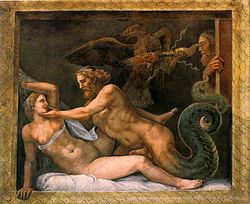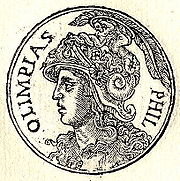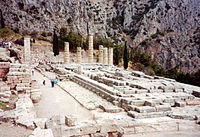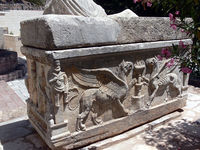- Olympias
-
 Zeus seduces Olympias. Fresco by Giulio Romano between 1526 and 1534, in Palazzo del Te, Mantua, Italy.
Zeus seduces Olympias. Fresco by Giulio Romano between 1526 and 1534, in Palazzo del Te, Mantua, Italy.
Olympias (Greek: Ὀλυμπιάς, pronounced [olympiás], ca. 375–316 BC[1]) was a Greek princess of Epirus, daughter of king Neoptolemus I of Epirus, the fourth wife of the king of Macedonia, Philip II, and mother of Alexander the Great. She was a devout member of the orgiastic snake-worshiping cult of Dionysus, and it is suggested by the biographer, Plutarch, that she may have slept with snakes.[2]
Contents
Origin
Olympias was the daughter of Neoptolemus I, king of the Molossians, a principal Greek tribe in Epirus, and sister of Alexander I. Her family was member of the Aeacidae, a well-respected family of ancient Greece, which claimed descent from Neoptolemus, son of Achilles. Apparently, she was originally named Polyxena, as Plutarch mentions in his work Moralia, and changed her name to Myrtale prior to her marriage to Philip II of Macedon, as part of her initiation to an unknown mystery cult.[3] The name Olympias was the third of four names by which she was known, taking it probably as a recognition of Philip's victory in the Olympic Games of 356 BC, which coincided with Alexander's birth.[4][self-published source?] She was finally named Stratonice, which was likely an epithet attached to Olympias following her victory over Eurydice in 317 BC.[3]
Marriage to Philip
When Neoptolemus I died in 360 BC, his brother Arymbas succeeded him on the Molossian throne. In 358 BC, Arymbas made a treaty with the new king of Macedonia, Philip II, and the Molossians became allies of the Macedonians. The alliance was cemented with a diplomatic marriage, when Arymbas' niece Olympias became Philip's wife in 357 BC and, consequently, queen consort of Macedonia. Philip had first fallen in love with Olympias when both were initiated into the mysteries of Cabeiri at the Sanctuary of the Great Gods, on the island of Samothrace.[5]
One year later, in 356 BC, Philip's race horse won in the Olympic Games; for this victory his wife, who was known then as Myrtale, received the name Olympias. In the summer of the same year, Olympias gave birth to her first child Alexander. In ancient Greece people believed that the birth of a great man was accompanied by portents. As Plutarch describes, the night before the consummation of their marriage Olympias dreamed that a thunderbolt fell upon her womb and a great fire was kindled, its flames dispersed all about and then were extinguished. After the marriage Philip dreamed that he put a seal upon his wife's womb, the device of which was the figure of a lion. Aristander's interpretation was that Olympias was pregnant of a son whose nature would be bold and lion-like.[6] Philip and Olympias also had a daughter, Cleopatra.
Their marriage was very stormy, Philip's volatility and Olympias' jealous temper had led to a growing estrangement. Things got even worse in 337 BC, when Philip married to a noble Macedonian woman, Cleopatra, who was niece of Attalus and after the marriage changed her name to Eurydice. This caused great tensions between Philip, Olympias and Alexander. Olympias went into voluntary exile in Epirus, staying at the Molossian court of her brother Alexander I who was the king at the time, along with her son Alexander who sided with her. In 336 BC, Philip cemented his ties to Alexander I of Epirus by offering him the hand of his and Olympias' daughter Cleopatra in marriage, a fact that led Olympias to further isolation as she could no longer count on her brother's support. However, Philip was murdered by his somatophylax Pausanias while attending the wedding and Olympias, who returned to Macedonia, was suspected of having countenanced his assassination.
Impact in politics
Olympias later ordered Eurydice and her child by Philip to be murdered, in order to secure Alexander's position as king of Macedonia. During Alexander's campaigns, she regularly corresponded with him and may have confirmed her son's claim in Egypt that his father was not Philip but Zeus. The relationship between Olympias and Alexander was cordial, but her son kept her away from politics. However, she wielded great influence in Macedonia and caused troubles to Antipater, the regent of the kingdom. In 330 BC, she returned to Epirus and served as a regent to her cousin Aeacides in the Epirote state, as her brother Alexander I had died during a campaign in southern Italy.
After Alexander the Great's death in Babylon in 323 BC, his wife Roxana bore him a posthumous son who was called Alexander IV. The latter, along with his uncle Philip III, half brother of Alexander the Great and mentally disabled, were subject to the regency of Perdiccas, who tried to strengthen his position by a marriage with Antipater's daughter Nicaea. At the same time, Olympias offered Perdiccas the hand of her daughter Cleopatra. Perdiccas chose Cleopatra, which angered Antipater; he invaded Macedon, deposed Perdiccas, and declared himself regent, only to die within the year.
Polyperchon succeeded Antipater in 319 BC as regent, but the latter's son Cassander, who had captured Philip III, forced him out of Macedonia. Polyperchon fled to Epirus, taking Roxana and her son Alexander IV with him. At the beginning, Olympias had not been involved in this conflict, but soon she realized that in case of Cassander's rule, her grandson would definitely lose the crown. As a result, she allied with Polyperchon and united his army with the army of her cousin Aeacides to invade Macedonia and drive Cassander out from power in 317 BC. She captured and executed Philip III in October of that year, while many supporters of Cassander were massacred. Cassander besieged Olympias in Pydna and forced her to surrender, although Polyperchon and Aeacides tried to relieve her. One of the terms of the capitulation had been that Olympias's life would be saved but Cassander executed her, while Roxana and Alexander IV were killed in secret. She was brought to trial for the numerous and cruel executions of which she had been accused of; condemned without a hearing, she was put to death in 316 BC by the friends of those whom she had slain. Cassander is said to have denied her remains the rites of burial.
Medals
A medal bearing the name Olympias was found in 1902 at Abukir, Egypt, and belongs to the Archaeological Museum of Thessaloniki. The reverse shows a Nereid mounted on a fantastic sea creature. It had been suggested that the Olympias depicted on the medal was Queen Olympias, but this theory has been challenged. The name ΟΛΥΜΠΙΑΔΟΣ is thought to refer to the Olympiads instead.[7] Archaeologists believe that these medals were awarded to the victors in the Olympic Games which survived during the Roman period in Macedonia cities such as Veria. These Games, known as the Alexandrian Olympics, were held in honour of the Roman emperors who visited the cities of Macedonia.[citation needed]
Olympias in the modern world
- Olympias is a character in Mary Renault's historical novels Fire from Heaven and Funeral Games.
- Angelina Jolie portrayed Queen Olympias in Oliver Stone's 2004 biopic Alexander, opposite Colin Farrell as Alexander the Great and Val Kilmer as Philip II.
See also
- Alkimachos of Pydna
- Olympias, reconstruction of Greek trireme.
References
- ^ "Olympias Queen of Macedonia". www.american-pictures.com. http://www.american-pictures.com/genealogy/persons/per01294.htm#0. Retrieved 2009-07-30.
- ^ "The nonsense about the snakes" is from Plutarch's Life of Alexander (2.6), according to Robin Lane Lox, Alexander the Great 1973:26 and note p. 504; Fox suggests that the snake-handling was the stuprum referred to by Justin9.5.9.
- ^ a b "Dixon on Carney". classicaljournal.org. http://classicaljournal.org/Dixon%20on%20Carney.pdf. Retrieved 2009-07-31.
- ^ Heckel 2006, p. 181
- ^ Plutarch, Alexander, 2.1
- ^ Plutarch, Alexander, 2.2–2.3
- ^ Jean Gagé, Alexandre le Grand en Macédoine dans la Ière moitié du IIIe siècle ap. J.-C., Historia: Zeitschrift für Alte Geschichte, Vol. 24, No. 1 (1st Qtr., 1975), pp. 1-16
Bibliography
Primary sources
- Plutarch, Alexander, Parallel Lives, online at Perseus Project.
Secondary sources
- Heckel, Waldemar (2006). Who's who in the age of Alexander the Great: prosopography of Alexander's empire. Wiley-Blackwell. ISBN 1405112107. http://books.google.com/books?id=JJ4K1wFZkrsC&dq.
External links
- "Olympias (Macedonian leader)". Encyclopædia Britannica Eleventh Edition. http://www.britannica.com/EBchecked/topic/427989/Olympias. Retrieved July 31, 2006.
- "Olympias". Livius. Articles on Ancient History. http://www.livius.org/oa-om/olympias/olympias.htm. Retrieved July 30, 2006.
- "Olympias". Online Encyclopedia. http://encyclopedia.jrank.org/NUM_ORC/OLYMPIAS.html. Retrieved July 30, 2006.
Categories:- 375 BC births
- 316 BC deaths
- 4th-century BC Greek people
- Ancient Greeks who were executed
- Ancient Epirotes in Macedon
- Ancient Macedonian queens consort
- Women in Hellenistic warfare
- Alexander the Great
- Wives of Philip II of Macedon
- People who died under the regency of Cassander
- Executed royalty of Macedon
- 4th-century BC executions
Wikimedia Foundation. 2010.



